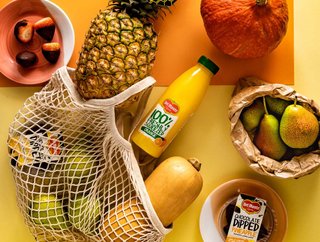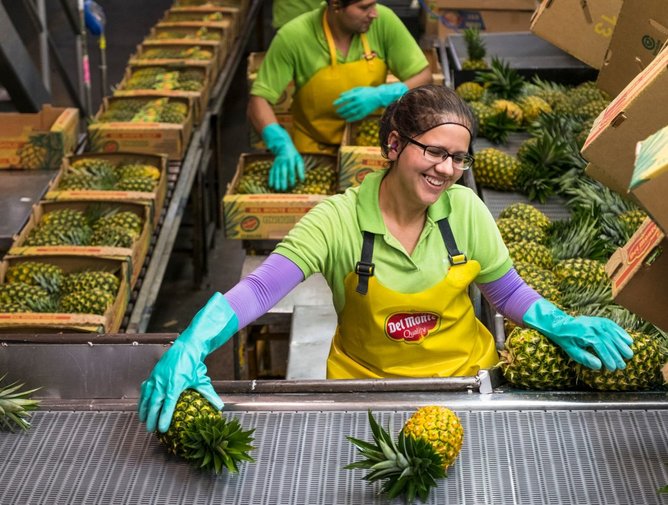Del Monte sets new sustainability standards in fresh produce

Consumers in Europe and North America can eat their favourite pineapples with a clearer conscience after Fresh Del Monte launched its Zero range.
The certified carbon-neutral fruit is grown in Costa Rica with the associated emissions of production and, importantly, distribution negated by the company’s carbon neutral programme that sees CO2 sequestered via five million trees on its own forest covering 8,000 hectares – along with upgrades to its transportation fleet.
This process is also known as insetting, delivering a product that has an immediate impact on sustainability.
Just one of a number of environmental milestones reached by Del Monte, as per its recently released sustainability report, Zero has set new industry standards and secured a shortlisted spot in the World Sustainability Awards 2023.
With the launch of its Zero range, Fresh Del Monte has set an “important new benchmark for the global fresh produce industry,” according to Stan Rhodes, President and CEO of certification body SCS Global Services.
“They have not only demonstrated adherence to extremely rigorous principles of social responsibility, environmental, and governance performance but have also focused on increasing carbon storage on the lands they own and manage while simultaneously minimising their GHG emissions to achieve carbon-neutral certification. In doing so, they are confronting the climate crisis head-on.”
Hans Sauter, Chief Sustainability Officer, Senior Vice President R&D and Agricultural Services at Fresh Del Monte added that going beyond the farm to include emissions from inland and oceanic transportation, distribution, and commercialisation was a major step in helping the environment.
Fresh Del Monte recognised for sustainability action
This was also one of many key initiatives outlined in the company’s recently released 2022 Sustainability Report, alongside cuts in greenhouse gas emissions, electrification of transport, and reduced food waste.
As one of the world’s leading producers, marketers, and distributors of fresh fruits and vegetables, with a market cap of US$1.13 billion, Fresh Del Monte markets its products in more than 80 countries worldwide under the Del Monte brand (under license from Del Monte Foods, Inc.) and employs more than 40,000 workers.
For Fresh Del Monte, the 'original plant-baed food company' and the first global marketer of fruits and vegetables to commit to the Science Based Targets initiative, sustainability permeates its entire value chain, from farm to market, showing that large-scale agriculture can be responsible too.
"As a global agribusiness, sustainability is ingrained in our identity and we recognise the pressing need to continue fortifying our operations against the changing climate,” said Sauter.
“We firmly believe that we can instigate transformative change and drive the adoption of innovative technologies for a more sustainable future. This ongoing journey necessitates investments and partnerships, recognising that the most substantial impact occurs when we collaborate.”

In its report, Fresh Del Monte says it diverted 93% of food waste from landfills in 2022 and became the first grower to join the Pacific Coast Food Waste Commitment.
Scope 1 and 2 emissions were reduced by 26% in 2022 thanks to optimised usage of fertiliser, fuel consumption, and facility heating adjustments, putting the company well on track (at a 94% completion rate) towards meeting its 27.5% Science Based Target emissions reduction goal by 2025 (compared to a 2020 baseline).
Fresh Del Monte planted 574,800 trees in 2022, with almost 30% of its farms now implementing regenerative agriculture practices. Renewable electricity provided 21% of global consumption. Since the installation of solar panels at its Costa Rica banana operation in 2017, monthly kWh usage has been reduced by 46%.
Delivering on (and even above) its targets, the company recently secured the SEAL Business Sustainability Award for its remarkable reduction of GHG across its agricultural value chain and for the second year running was named a Humankind 100 Company by Humankind Investments, which recognises companies that impact access to food and clean water, healthcare, and digital services.
“As a company, we are constantly looking to reduce our greenhouse gas emissions, water withdrawals, food waste, and plastic usage, among many other things, that directly impact our planet,” said Sauter in the report.
“Advancements in science and technology are at the top of our list, and the involvement of our supply chain will be crucial to achieving the desired impacts in the near future. We believe that we can effect change and bring about the adoption of new technologies to create a more sustainable future.”






